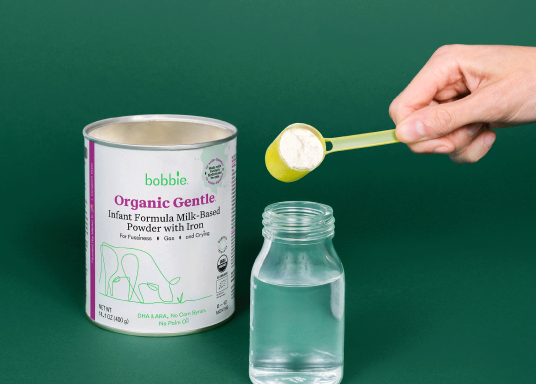Published May 15, 2025

When Do Babies Sleep Through The Night? Tips from NAPS Professionals
By the NAPS experts Emily Silver NP-C, IBCLC and Jamie O'Day, RN, IBCLC
Let’s talk sleep, nighttime feeding, and naps in the first year.
One of the most common questions we get at NAPS (Newborn and Parenting Support) is, "When will my baby sleep through the night?" The answer? It depends! Every baby is different, and when it comes to sleep, it’s really a combination of when your baby is ready and—more importantly—when parents are ready. Some babies naturally space out feeds and sleep longer stretches at night. Many will shift to an earlier bedtime around 12-16 weeks. As overnight sleep becomes more consistent, daytime sleep starts to consolidate and settle into a rhythm.
So, let’s talk about a flexible schedule—aka ranges to aim for based on your baby’s age. These will help you establish a routine that works for your family while also setting the foundation for solid sleep. And, of course, we’ll cover what to do when things don’t go according to plan (because they won’t always!).
Newborn Baby (0-3 Months): Welcome to 24/7 Mode
Newborns don’t exactly run on a schedule—it’s more of a continuous cycle. At NAPS, we like to remind parents that their only job in the first 12 weeks is to feed their baby and not let them get overtired.
Here’s what that looks like:
-
Feeding: Your baby may eat on demand or roughly every 2-3 hours during the day. Once they regain their birth weight, most pediatricians agree that overnight, your baby can be your alarm clock—meaning, you can wait for them to wake up on their own to eat.
-
Why daytime feeds matter: More daytime calories = longer stretches of sleep at night. If you’ve heard the phrase “never wake a sleeping baby”—that doesn’t apply here! If they miss daytime feeds, they’ll likely make up for them overnight.
-
Awake windows: Newborns can tolerate only about 60-90 minutes of awake time (including feeding!). If you push them too long, they’ll unravel.
-
Naps: Length varies—some will be 20-30 minutes, others may stretch to 1-2 hours. Just focus on getting them to sleep however you can (swaddling, soothing, on-the-go).
At this stage, your baby’s needs drive the day—not a strict routine. Naps can happen in a crib or bassinet, or they may happen on a stroller walk or in a baby carrier. The key is ensuring that when you put your baby down on their own, they are on their back, swaddled, and in a safe sleep space (no blankets, pillows, or bumpers). Night sleep will stretch over time as their stomach grows and they take in more calories during the day. Until then, set your coffee the night before—you’ll thank yourself in the morning.


Your go-to resource for all things new baby.
Sign up to get the scoop on feeding, sleep, poop, and so much more.
By singing up for email, you are to receive marketing emails from Bobbie and can manage your email preferences or unsubscribe at anytime
Baby 3-5 Months: So. Much. Change.
Things start shifting at this age, and it’s exciting! One night, your baby may suddenly want to go to bed earlier (somewhere between 6-8 pm), and longer stretches of sleep become more common.
-
Overnight sleep: Some babies naturally start sleeping through the night. Others may take a dream feed around 9 pm and sleep a long stretch. Some still wake up once or twice. If you’re interested in sleep training, this can be a great time to start—but not every baby needs it, and not every parent wants to do it. It’s completely up to you.
-
Naps: Most babies take three to four naps per day, with wake windows between 1.5-2.5 hours.
-
Feeding: Some babies still eat every 2-3 hours, while others space feeds out to every 3-4 hours. Not all babies reach that perfect four-hour feeding schedule, and that’s okay! If your baby is sleeping well overnight but still eats more frequently during the day, that’s not necessarily a problem that needs fixing.
Some days will feel smooth; others will feel chaotic as you navigate the ideal bedtime and routine while sorting out daytime naps. That’s normal! This is also when many parents return to work, which can shake things up. Be kind to yourself—this is just a phase.
Baby 6-12 Months: Finding Your Rhythm
Between 6-12 months, your baby’s sleep and feeding patterns continue to evolve. Around 8 months (give or take), most babies transition from three naps to two, and wake windows gradually extend from 2.5 hours to 4 hours by 12 months.
-
Naps: Two to three naps per day at first, consolidating into two longer naps by 8-9 months. Each nap typically lasts 1.5-2.5 hours.
-
Feeding: Every 3-4 hours, with solids introduced around 6 months. By 9-12 months, meals take on a bigger role, and most babies have 3 solid meals plus 2-3 milk feeds per day.
-
Night sleep: Ideally, 11-12 hours overnight, often uninterrupted. Some babies still wake once at night, but many sleep through.
Sleeping through the night means that your baby goes to bed on their own and sleeps 11-12 hours overnight without needing a feed. If they wake or cry out, many can put themselves back to sleep independently.
If naps become a struggle at this stage, it’s often one of two things:
-
They aren’t tired enough yet—meaning they may be ready to drop a nap or extend wake windows.
-
They're overtired - which often happens when daycare naps are short and inconsistent. In this case, an earlier bedtime and solid sleep on weekends can help.
Final Thoughts
This guide is meant to be flexible. Some babies need more sleep, some need less. Some sleep through the night early, some take longer. And guess what? It’s all normal. The goal is to find a rhythm that works for your baby and your family.
Need more support? Nurture by NAPS has a resource to help you get the sleep you need.
The content on this site is for informational purposes only and not intended to be a substitute for professional medical advice, diagnosis or treatment. Discuss any health or feeding concerns with your infant’s pediatrician. Never disregard professional medical advice or delay it based on the content on this page.








